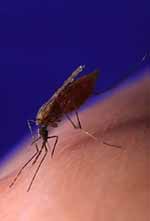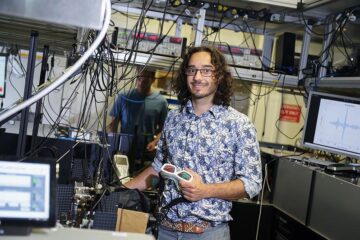Blood gene saps malaria

Mutant haemoglobin takes the sting out of malaria infection <br>© SPL <br>
A rare form of haemoglobin protects against malaria.
One in ten people in the west African country Burkina Faso have a gene that defends them against malaria, a new survey shows.
The gene encodes a mutant form of haemoglobin, red-blood cells’ oxygen-carrying molecule. People with one copy of the gene are 26% less likely to get sick with malaria. Those with two – one from mum and one from dad – have an unprecedented 93% reduction in malaria risk 1.
The mutation, called HbC, „is very protective against severe malaria“, says parasitologist David Modiano of the University of Rome, who led the research. Why is not yet clear. Researchers hope understanding the effect will lead to treatments for malaria.
„Haemoglobin mutations have arisen under selective pressure from malaria,“ says Thomas Wellems of the National Institute of Allergy and Infectious Diseases in Bethesda, Maryland. „It’s nature’s way of telling us which factors protect against the disease.“
Other forms of haemoglobin hinder malaria – for instance in people who have one copy of a mutation called HbS, common throughout Africa. But those with two copies of HbS die young from sickle-cell anaemia.
People with HbS or HbC get infected with malaria as normal, but somehow the mutations stop the infection causing severe symptoms such as anaemia and coma – a tantalizing prospect for scientists trying to develop vaccines and other anti-malarial drugs.
Spread bets
Researchers have suspected that HbC has protective effects for about 50 years, but the gene is far less common than HbS, making it difficult to study. People with two copies of the gene are even more unusual.
If the HbC mutation fends off malaria so successfully, why isn’t it found throughout sub-Saharan Africa where malaria is endemic? Especially given that it is harmless compared with the HbS mutation that causes sickle-cell anaemia.
Modiano believes that, unlike HbS, the mutation will take a long time to spread and establish itself throughout Africa because it is rare outside the Mossi ethnic group and two copies of the gene are needed for full protection.
Wellems disagrees. He thinks the level of protection HbC or HbS afford depends more on a person’s other genes. In some ethnic groups – in Nigeria for example – HbS is more protective and therefore more common.
The HbS and HbC mutations occur in exactly the same place in the haemoglobin molecule, suggesting the mechanism could well be universal – making it an ideal target for future malaria drugs. „If we can nail the protective mechanism, maybe we can come up with that target,“ says Wellems.
References
- Modiano, D. et al. Haemoglobin C protects against clinical Plasmodium falciparum malaria in the homozygous state. Nature, 414, 305 – 308 , (2001).
Media Contact
Weitere Informationen:
http://www.nature.com/nsu/Alle Nachrichten aus der Kategorie: Medizin Gesundheit
Dieser Fachbereich fasst die Vielzahl der medizinischen Fachrichtungen aus dem Bereich der Humanmedizin zusammen.
Unter anderem finden Sie hier Berichte aus den Teilbereichen: Anästhesiologie, Anatomie, Chirurgie, Humangenetik, Hygiene und Umweltmedizin, Innere Medizin, Neurologie, Pharmakologie, Physiologie, Urologie oder Zahnmedizin.
Neueste Beiträge

Neue universelle lichtbasierte Technik zur Kontrolle der Talpolarisation
Ein internationales Forscherteam berichtet in Nature über eine neue Methode, mit der zum ersten Mal die Talpolarisation in zentrosymmetrischen Bulk-Materialien auf eine nicht materialspezifische Weise erreicht wird. Diese „universelle Technik“…

Tumorzellen hebeln das Immunsystem früh aus
Neu entdeckter Mechanismus könnte Krebs-Immuntherapien deutlich verbessern. Tumore verhindern aktiv, dass sich Immunantworten durch sogenannte zytotoxische T-Zellen bilden, die den Krebs bekämpfen könnten. Wie das genau geschieht, beschreiben jetzt erstmals…

Immunzellen in den Startlöchern: „Allzeit bereit“ ist harte Arbeit
Wenn Krankheitserreger in den Körper eindringen, muss das Immunsystem sofort reagieren und eine Infektion verhindern oder eindämmen. Doch wie halten sich unsere Abwehrzellen bereit, wenn kein Angreifer in Sicht ist?…





















